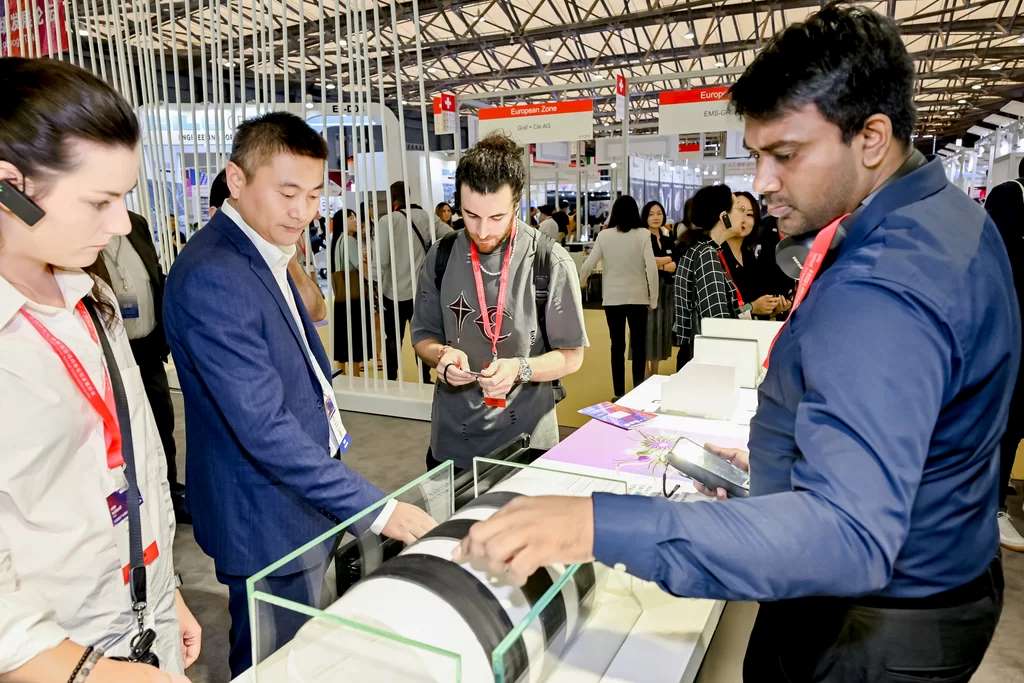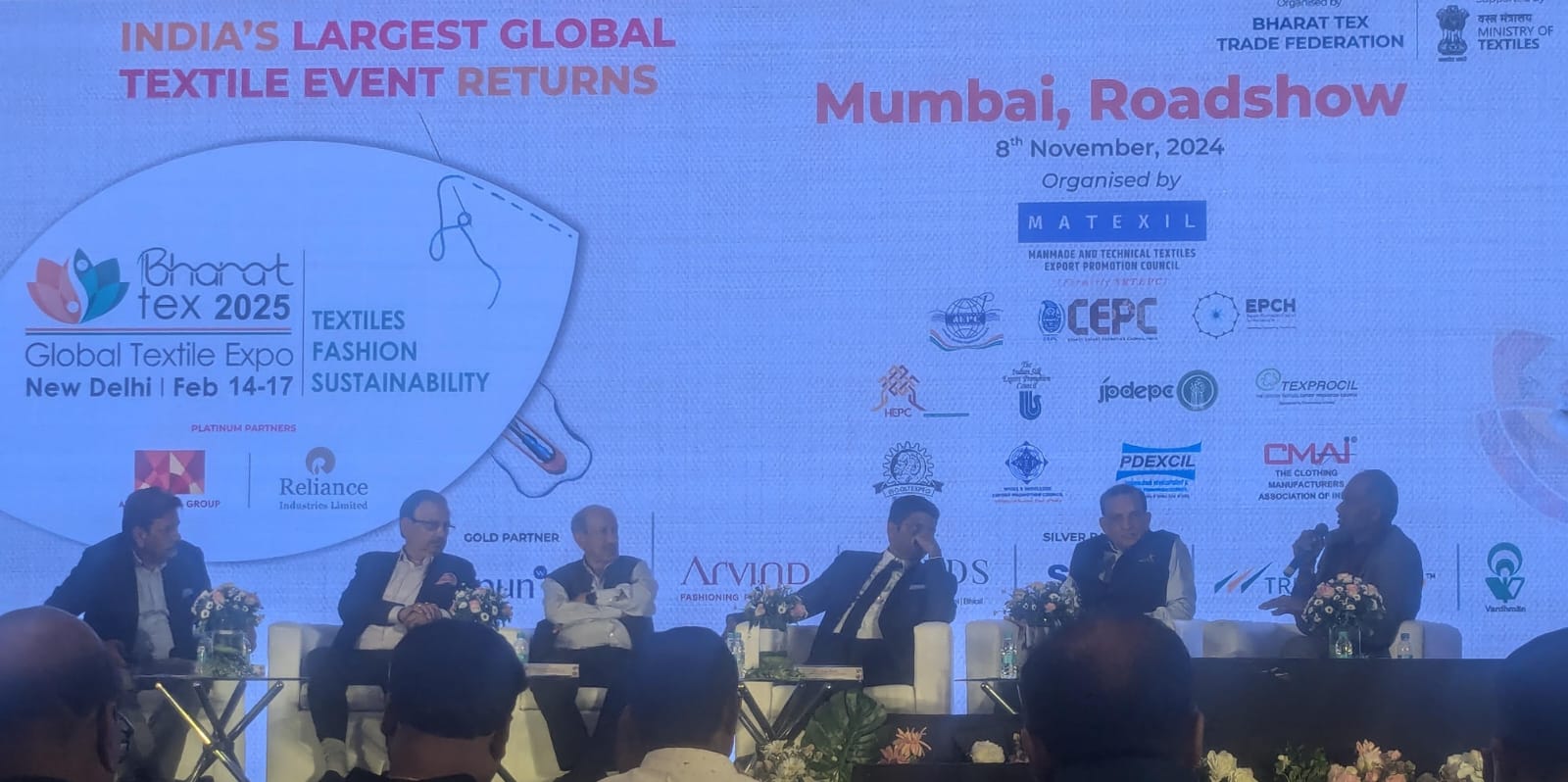FW
The 63rd edition of Filo is scheduled to be held from Feb 26-27, 2025 at the FieraMilanoCity Viale Scarampo in Milan.
The 62nd edition of the international yarn and fiber exhibition was held successfully from Sep 18-19, 2024 in Milan. Generating positive responses from both exhibitors and buyers, the event showcased high-value collections that highlighted the innovative capabilities and sustainability efforts of both Italian and international textile manufacturers. The continuous flow of buyers throughout the two-day fair reflected the strong interest in these cutting-edge products.
One of the striking features of the 62nd edition was a significant increase in foreign visitors, a testament to Filo’s global reach and appeal. This achievement was partly due to the ongoing partnerships with ICE-Agency and Regione Piemonte-Ceipimonte, which played a crucial role in drawing international buyers to the event.
Paolo Monfermoso, Head, Filo, notes, despite a challenging period marked by a slowdown in international markets, the 62nd edition of Filo reaffirmed its status as a key reference point for the industry. The event one again validated the belief any crisis can be overcome through hard work, innovation and production enhancement.
In anticipation of the World Cotton Day on Oct 7, UK-based sustainable cotton organisation, CottonConnect and the Cotton Egypt Association (CEA) have teamed up to raise awareness about and expand the scope of regenerative cotton practices in Egypt.
The two organisations have signed an MoU to advance regenerative cotton farming by supporting CottonConnect’s REEL Regenerative Program. The initiative aims to build more resilient cotton supply chains and improve the livelihoods of farmers in the face of climate change.
As a non-profit dedicated to protecting and promoting the Egypt’s Cotton identity, CEA will assist CottonConnect in scaling the REEL Cotton Program which has already demonstrated a tangible impact in Egypt. Participating farmers have reported a 15 per cent -30 per cent reduction in water and chemical usage, a 15 per cent increase in yield, and a 30 per cent boost in profits.
This collaboration is seen as a critical response to the country’s ongoing challenges with climate change, given that Egypt is projected to be classified as ‘water scarce’ by 2025 by the United Nations, By adopting regenerative farming techniques, CottonConnect and CEA aim to help farmers adapt to and mitigate the worst effects of these environmental pressures.
This partnership also aligns with the theme of World Cotton Day: ‘Cotton for Good’. Both organisations are committed to advancing sustainable cotton farming practices that support environmental resilience while enhancing the livelihoods of cotton farmers across Egypt.
During the International Cotton Advisory Committee Plenary Meeting, the Private Sector Advisory Council (PSAC) hosted its Fifth Open Session, titled ‘Traceability and Sustainability Requirements in Natural vs Man-made Fibers.’
Peter Wakefield, Chair of PSAC and Wakefield Inspection, introduced four speakers to discuss key topics related to cotton’s sustainability and traceability. Anees Khawaja from MG Apparel emphasized the need to focus on cotton’s biodegradability and role in providing jobs, contrasting it with synthetic fibers, which lack these benefits.
Marc Lewkowitz of Supima, representing the Producers and Ginners Committee, proposed three recommendations for cotton traceability: defining a common traceability standard, developing a streamlined bale ID system, and supporting a gradual transition to global traceability implementation.
Eimear McDonagh from Agri Direct Australia highlighted that cotton faces stricter standards than other fibers and stressed the importance of working with governments and brands for future success.
Debra Guo of Textile Exchange discussed ‘preferred materials,’ advocating for fibers that reduce environmental impacts and promote sustainability through improved production systems.
The session underscored the growing importance of sustainability and traceability in the global cotton industry.
Adjusting its full-year revenue expectations to the lower end of its previous forecast, Levi Strauss & Co has raised concerns about stagnating demand for its apparel. The company has lowered its expectations for net revenue growth for the current fiscal to 1 per cent as against the earlier estimate of 1 per cent to 3 per cent.
In Q3 FY25 that ended on Aug 25, the company’s sales fell slightly below analysts’ expectations. Notably, revenues for the Americas division of Levi’s experienced a decline. The
Levi’s has been focusing on increasing sales through its own channels, including its stores, website, and app, as shoppers shift away from department stores, which have traditionally been key for large apparel brands. While Levi's direct-to-consumer efforts showed progress with 10 per cent growth, its wholesale business declined by 6 per cent compared to the same quarter last year.
The company is also reviewing strategic options for its Dockers brand, which could include a potential sale. Sales of the brand fell by 15 per cent during the latest quarter, generating $73.7 million in revenue. Levi’s has hired Bank of America as a financial adviser for this process.
Despite these challenges, the company’s namesake brand is gaining momentum, emphasised Michelle Gass, CEO emphasised highlighting the strength of its direct-to-consumer segment.
Textile millers have expressed deep concerns over the ongoing challenges facing Pakistan’s textile industry, which is underperforming in export markets by a significant $9 billion below its potential.
A high-level delegation from the All Pakistan Textile Mills Association (APTMA), including Kamran Arshad, Chairman; Asad Shafi, Chairman-North and Naveed Ahmed, Chairman-South recently met Ali Pervaiz Malik, Minister of State for Finance and Revenue, and senior officials from the Federal Board of Revenue to address the industry's pressing issues.
The delegation acknowledged the positive impact of Pakistan’s successful negotiations with the International Monetary Fund (IMF) for a $7 billion loan program, crucial for stabilising the country’s economy. However, while they commended the government’s efforts to reduce cross-subsidies in industrial power tariffs, they stressed that more needs to be done to make electricity prices competitive within the region.
Currently, the industrial electricity tariff in Pakistan is around 15 cents per kWh, significantly higher than the 6-9 cents per kWh in neighboring countries like India, Bangladesh, and Vietnam. The millers also raised alarm over the government’s agreement with the IMF to halt gas supply to captive power plants (CPPs) of industrial units by Dec 2024. APTMA warned, industries relying on gas-fired power are unlikely to transition to the national grid due to the high cost of electricity. If gas supplies are cut off, many industries may seek alternative energy sources or be forced to shut down operations.
Another key issue discussed was the withdrawal of the zero-rating facility, or sales tax exemption, on local supplies required for manufacturing export goods under the Export Facilitation Scheme. The removal of this exemption has caused exporters to switch from domestically produced inputs to imported raw materials, as the 18 per cent sales tax on local supplies—though refundable—takes months to process, straining liquidity and driving up production costs.
This policy change has severely impacted the spinning sector, noted APTMA. By June 2024, yarn production had dropped by 41 per cent, while cotton yarn imports increased by 435 per cent Y-o-Y in August 2024. Over 40 per cent of spinning units have been forced to close, resulting in widespread unemployment and loss of livelihoods.
The association also raised concerns over the misuse of the Export Facilitation Scheme, where yarn imported under the scheme for exportable goods is being illegally sold in the domestic market. This practice is harming the local textile industry and undermining its competitiveness.
The delegation urged the government to reconsider its policies, particularly regarding energy pricing, tax exemptions, and the misuse of import schemes, to help revive the textile sector and restore its potential in export markets.

Cinte Techtextil China 2024, held from September 19–21, marked a significant milestone for the technical textiles and nonwovens industries, showcasing how these sectors are adapting to global demand. The event hosted nearly 400 exhibitors from 13 countries, attracting close to 17,000 visits from 77 regions. The trade fair featured an extensive display of innovations and sustainable products, underscoring the pivotal role technical textiles are playing across industries like medical, automotive, construction, and industrial sectors.
Expanding opportunities in technical textiles
Demand for technical textiles and nonwovens has surged due to various factors, including population growth, industrialization, and heightened public concern for healthcare. Technical textiles used in medical treatments, protective gear, and construction materials saw increased attention at the fair. The rise of e-mobility, particularly electric vehicles, has further driven demand for automotive textiles.
Exhibitors at the event showcased cutting-edge technologies and sustainable innovations, with a strong focus on nonwovens, weaving machines, and composite lines. Among the key international players, Autefa, JH Ziegler, Lindauer Dornier, Perlon, and Reifenhauser, all represented Germany’s advancements in the field. Meanwhile, industry giants like Andritz Nonwoven, Dilo Group, and Groz-Beckert highlighted their latest innovations.
Renewed market potential in China
The return of the German Pavilion and the European Zone was a major highlight, as these exhibitors capitalized on China’s recovering domestic market. Messe Frankfurt (HK) General Manager, Wilmet Shea, emphasized how the show continues to position itself as Asia’s leading technical textiles event, drawing in international visitors and offering diverse solutions across various application areas.
Shea noted that there was strong demand in sectors such as medical, protective, automotive, industrial, and construction textiles. She added that the fringe events enhanced the fair's appeal by focusing on innovation and sustainability.
Several international exhibitors participated in Cinte Techtextil China for the first time. Notable names included AiDLab from Hong Kong, FPC Industrial from Saudi Arabia, and Nihon Glass Fiber from Japan, who expressed optimism about the fair’s role in fostering business growth.
High impact exhibitor experiences
Exhibitors praised the fair for its effectiveness in connecting them with both domestic and international buyers. Kabilen Sornum, Vice President of Marketing & E-Commerce at Groz-Beckert East Asia, highlighted the event as a key platform for accessing China's vast market, noting the strong turnout from a wide range of countries.
Chinese exhibitors also made a strong impact, with six regional pavilions, including Foshan Jiujiang and Zhejiang Tiantai, debuting at the event. Zhao Chixian, Deputy General Manager of IBENA Shanghai Technical Textile, praised the fair’s high visitor turnout, which included industry leaders and VIP buyers.
Diverse global presence and buyer engagement
The increase in visiting countries and regions by 25, compared to the previous edition, underscored the growing international interest in technical textiles. Top countries represented included Korea, Taiwan, India, and Germany. VIP buyers from 15 countries were invited, representing diverse sectors, with key delegations coming from Mexico, Australia, and India.
Visitors were impressed by the variety of products and innovations showcased at the fair. Claudia Moreno, Sourcing Manager at Group Dragon in Mexico, emphasized the event's role as a gateway to the Chinese and Asian markets and appreciated the focus on sustainable products. She mentioned making valuable contacts for potential future collaborations.
Similarly, Zhang Guoping, Production Department Head at Shikishima Industrial Fabrics, China, noted the fair’s effectiveness in connecting them with potential partners, stating they were already planning detailed post-fair discussions for future collaborations.
Spotlight on sustainability and innovation
Fringe events at Cinte Techtextil China further solidified its status as a leading platform for innovation and sustainability. Panels, guided tours, and seminars focused on how sustainability can be integrated into various sectors, from automotive to construction. A standout event was AiDLab’s presentation on automating textile inspection using AI, which garnered significant interest from attendees.
Karl Borgschulze, Managing Director of Consulting Service International, emphasized the importance of innovation as a driver for sustainability, noting that fairs like Cinte Techtextil China provide critical solutions for complex industry challenges.
Cinte Techtextil China 2024 successfully demonstrated the global demand for technical textiles and nonwovens, bridging international markets and fostering collaboration. The next edition is set for September 2025, promising even more innovations and opportunities as the industry continues to grow and adapt to new challenges.
In his inaugural address, Kamran Arshad, Chairman, All Pakistan Textile Mills Association (APTMA), reiterated the association’s commitment to revitalise the textile sector in Pakistan.
Arshad recently assumed office for a two-year term (2024-26) alongside Muhammad Jameel Qasim, Senior Vice Chairman and Siddique Javed Bhatti, Vice Chairman. On the other hand, Shahzad Ahmed Sheikh was appointed as the Vice Chairman of the value-added sector.
Additionally, Fawad Anwar of Al-Karam Textile Mills has been appointed Chairman of the Pakistan Textile Council (PTC) while Musadaq Zulqarnain has been elected as the Vice-Chairman.
At a session organised by the All India Professional’s Congress, P Chidambaram, Former Union Minister emphasised on the need to reducing import duties in the apparel sector to ensure a more sustainable growth.
Chidambaram pointed out, when the BJP government took power in 2014, the average customs tariff was only 8 per cent, but it has now risen to 13 per cent. He argued that an economy heavily controlled by the government cannot compete effectively in the global market.
During the seven years of Prime Minister Modi’s administration since 2016, India’s apparel exports dropped by 15 per cent, Chidambaram revealed. On the other hand, exports from Bangladesh increased by 65 per cent during the same period. Data from the Apparel Export Promotion Council shows, India’s apparel exports declined from $16.2 billion in 2022–23 to $14.5 billion the following year. Although some improvement is anticipated in 2024–25, exports continue to remain below the previous year’s levels.
He criticised the imposition of government control in the industry through regulations like the Company’s Act, Income Tax Act, and the rules set by the Director General of Foreign Trade (DGFT).
Chidambaram also criticised the government for neglecting labor-intensive sectors like apparel manufacturing. He pointed out, while China's decline has benefitted Bangladesh and Vietnam’s garment sectors, India has not experienced similar advantages. He reiterated that tariffs on apparel have escalated.
Leading importer and distributor of knitting machines, Goldstone International showcased its latest technological innovations at the recent Garment Technology Expo (GTE) 2024 in Bengaluru.
A specialist in flatbed computerised knitting machines, Goldstone has been a supplier of state-of-the-art machinery to both garment and footwear manufacturers across India for over a decade. The company is known for its high-quality products, prompt deliveries, competitive pricing, and exceptional after-sales support.
The company’s key exhibit at GTE 2024 was the whole garment machine. According to Bhupesh Jain, Director, this advanced machine enables the company to create fully knitted garments with minimal human intervention. It eliminates the need for stitching, significantly reducing both labor costs and production time, making it an appealing option for manufacturers looking to boost efficiency, he adds.
Highlighting the cost-benefits of the new machine, Jain cites yarn wastage and overall time savings in production process as primary advantages. Automation also ensures greater consistency, reducing the need for manual oversight and intervention, he adds.
The response to the machine at GTE 2024 from visitors and potential buyers has been overwhelmingly positive, says Jain. Goldstone International continues to lead the market as the largest importer of footwear knitting machines in India since 2017, he adds.
Emphasising the importance of automation in garment manufacturing, Jain notes, it guarantees consistent output. With standardised processes being crucial, automation is the way forward, he explains. To support the adoption of these new technologies, Goldstone International offers training programs in collaboration with educational institutions, helping students learn how to operate the advanced knitting machines.
Goldstone International also provides subsidised machines to educational institutes to address the shortage of skilled workers capable of operating sophisticated machinery. The company ensues the next generation is equipped with the skills needed to work with modern knitting technology, Jain points out. It remains committed to empowering future operators to understand and utilise automated knitting systems, he concludes.
Busana Apparel Group, established in 1975, is a global leader in the fashion industry, offering a diverse product line that includes woven dress shirts, women’s tops, bottoms, denim, outerwear, and knits. The company operates 24 manufacturing facilities across Indonesia and Ethiopia, employing over 33,500 workers and producing 70 million units annually. Busana’s production capacity and innovation make it a key player in global fashion.
In a recent development, Busana Apparel joined the International Textile Manufacturers Federation (ITMF) as a corporate member. Christian Schindler, Director General of ITMF, welcomed Busana, highlighting the mutual benefits of this collaboration. ITMF connects producers of fibers, yarns, fabrics, and machinery, fostering an exchange of expertise across the entire textile value chain.
Chairman Maniwanen Marimoetoe of Busana Apparel expressed that membership in ITMF grants access to valuable industry reports, statistics, and surveys. Additionally, it enhances connections with key companies worldwide, supporting Busana's goal of staying competitive and informed in the global market.
By joining ITMF, Busana Apparel is set to strengthen its global presence and enhance its position within the textile industry.












